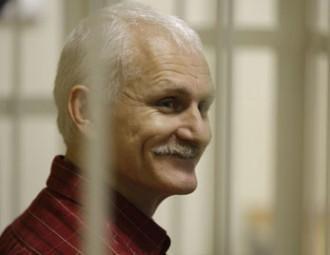Ales Bialiatski won the 2014 Civil Rights Defender of the Year Award

Ales Bialiatski, founder of the Belarusian human rights organisation «Viasna”, is announced the Civil Rights Defender of the Year 2014.
For over 30 years, Ales Bialiatski has pursued a life of continuous struggle to campaign for democracy and human rights, first in the Soviet Union and then in Belarus. Ales’ wife Natalia Pinchuk and colleague Tatsiana Raviaka were in Stockholm to receive the award on his behalf. The Civil Rights Defender of the Year Award is given out on April 4, which is the anniversary of the assassination of Dr. Martin Luther King.
Valiantsin Stefanovich, vice president of the Human Rights Centre “Viasna”, said that “it is important for Ales to receive this recognition”.
“An external show of support like this award, goes a long way to strengthening both him and all of us at «Viasna” and also provides the inspiration to continue to fight for a democratic Belarus. Only with pressure from the outside world can we bring about long lasting change,” - quotes belngo.info Valiantsin Stefanovich’s words.
“The trial of Ales Bialiatski was initiated despite international protests and demands for his release. The process of prosecuting Ales was directly linked to his human rights work and the verdict serves as a warning to the entire Belarusian civil society”, says Robert Hårdh, Director of Civil Rights Defenders.
Reference
Let us recall that Ales Bialiatski, chairman of an unregistered Belarusian human rights organization “Viasna” (Spring) and vice president of the International Federation for Human Rights, was arrested in Minsk on August 4, 2011. On November 24, 2011, he was sentenced to four and a half years in prison on a charge of large-scale tax evasion. The charge stemmed from information about his bank accounts abroad, which was thoughtlessly provided by authorities in Lithuania and Poland under interstate legal assistance agreements. During his trial, Mr. Bialiatski insisted that the money transferred by various foundations to his bank accounts abroad had been intended to finance Viasna's activities and therefore could not be viewed as his income subject to taxation.
According to those who have been in contact with him, Ales, maintains his indomitable spirit but is showing signs of deteriorating health. Valiantsin Stefanovich said that Belarusian prisoners are frequently exposed to torture and degrading treatment.
Ales has previously been honored with several other awards, including the Swedish Per Anger Prize, the Václav Havel Prize and the Homo Homini Prize. As EuroBelarus Information Service earlier reported, he has been nominated for the Nobel Peace Prize twice, in 2012 and 2013.
-
03.01
-
07.10
-
22.09
-
17.08
-
12.08
-
30.09



























